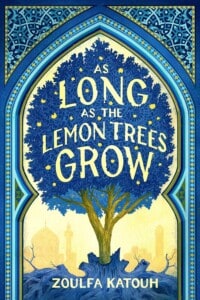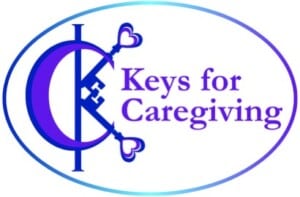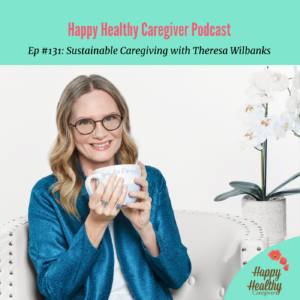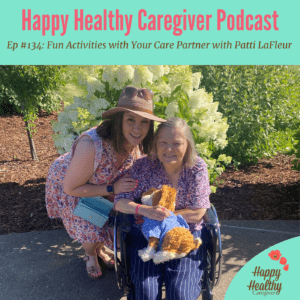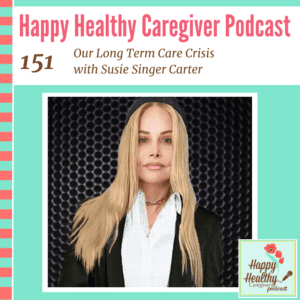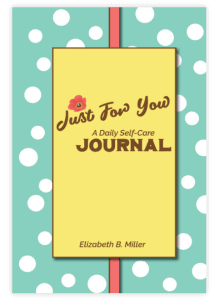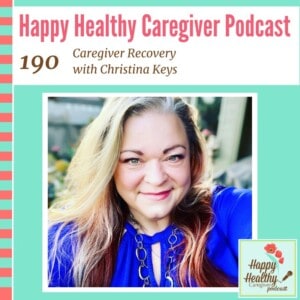
Christina Keys was living the American dream until one day in March of 2013, her mom had a life-changing stroke. Within 3 years of caregiving for her mom Pat, Christina was financially, emotionally, and mentally bankrupt. Her doctors told her that the stress of caregiving was literally killing her. Christina took action to make a different choice and turned her caregiving co-dependent mess into a message.
In this episode of the Happy Healthy Caregiver podcast, Christina shares a few of her priceless caregiving stories, reveals her first act of self-care, explains how she redefined normal and introduces the vibrant community she is building to help family caregivers locate the keys to a successful caregiving life.
Scroll to the bottom of this page to see the full-show transcription.
Episode Sponsor – Rare Patient Voice
Do you want to earn cash in exchange for your opinion? Rare Patient Voice (or RPV) helps connect researchers with patients and family caregivers for over 700 diseases and conditions. For patients and caregivers, RPV provides the opportunity to voice their opinions to improve medical products and services while earning cash rewards. Rare Patient Voice – helping patients and caregivers share their voices! If you are interested, join the RPV panel: https://rarepatientvoice.com/happyhealthycaregiver
Listen to the show: Caregiver Recovery with Christina Keys
Watch the show
Words of Encouragement
Each episode starts with a few words of inspiration or motivation from the Happy Healthy Caregiver Jar. Create your jar by downloading the Caregiver Jar inserts. Enhance your jar with the Caregiver Jar refill pack.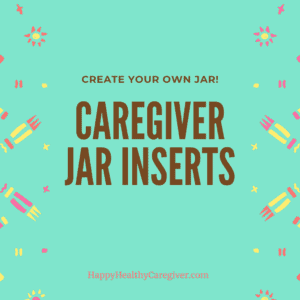
Links & Resources Mentioned
- WCN Streaming Radio – download the app and listen on demand
- Come cruise with me and some of my fellow care advocates in October 2025! We’ve planned this respite filled Self Care at Sea cruise with family caregivers in mind! Learn more at https://bit.ly/HHCselfcarecruise
- Professional Keynote Speaker, Caregiving & Self-Care – hire Elizabeth for your next corporate event
- WCN University – a digital course library for family caregivers
- Connect with Elizabeth on Instagram
- We are grateful for our listeners helping to expand our audience by sharing the podcast and submitting ratings and reviews! It’s easy to do. Just go to: Podcast Review or Google Review
- Join the Happy Healthy Caregiver email list to stay up to date on all of the podcast happenings! Every Tuesday, you’ll get the weekly roundup, including tips under Happy, Healthy, and Caregiver pillars. Plus – upcoming events, special offers, and more! Visit http://bit.ly/HHCeNews
- Schedule your complimentary coaching session for family caregivers
- What I’m Currently Reading:
- Christina and her mom with crowns
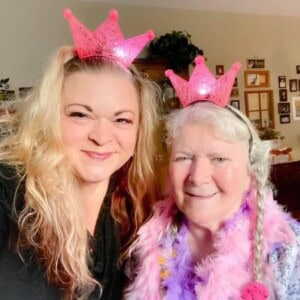
- Christina and her mom at the hospital
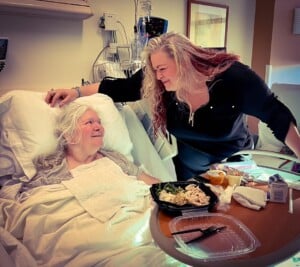
- Teamwork
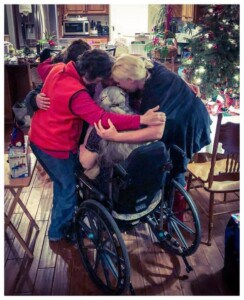
- Liar Liar Jim Carrey
- Support in Vancouver, WA area
- Christina’s ‘Community Text Line’ – 360-230-7736
- Christina’s speaker page
- Other podcast episodes mentioned:
- All of the prompts from the lightning round segment of the show are borrowed from Elizabeth’s book Just For You: a Daily Self-Care Journal. The journal is also now available as a digital download.
Some of the links on this page are affiliate links. When you click on a product and choose to purchase it, I receive a small thank you from the associated company which helps reimburse me for my blogging, podcast, & site expenses. There is no additional cost to you.
Favorite moments & quotes from the episode
Stay in touch
- Rate and review the podcast.
- Subscribe to the show on your favorite podcast platform!
- Instagram: HappyHealthyCaregiver
- Join the Happy Healthy Caregiver Facebook Group and our Facebook Page
- Twitter: @HHCaregiver
- Subscribe to the Happy Healthy Caregiver newsletter to stay updated on the latest posts & events.
- Email Elizabeth with questions or comments about the show or to request information about sponsoring the show.
Full Transcription
This is the whole care network helping you tell your story. One podcast at a time content presented in the following podcast is for information purposes, only views and opinions expressed in this podcast are solely those of the host and guest and may not represent the views and opinions of the whole care network. Always consult with your physician for any medical advice and always consult with your attorney for any legal advice. And thank you for listening to the whole care network.
Everything was painful in my life, emotionally, mentally, spiritually, physically, you know, it was all it was. I constantly felt like I was failing. You know, it’s, it’s not easy for us caregivers to, you know, watch the person we care for. Slowly decline.
Caring for aging parents or other loved ones while working, raising Children and trying to live your own life, wondering how to find the time for your personal health and happiness. Well, you’re in the right place. Welcome to the Happy Healthy Caregiver podcast. The show where real family caregivers share how to be happy and healthy while caring for others. Now, here’s your host, Family Caregiver and Certified Caregiving consultant, Elizabeth Miller.
Hello, so glad you are here. Thanks for tuning in to the Happy Healthy Caregiver podcast, which is part of the whole care network. This is a show that’s produced biweekly to help family caregivers integrate self care and caregiving into their lives. Each episode has an accompanied show notes page. So if you want more details about any of the stuff that we’re gonna talk about, you’ll find the show notes by going to the website Happy Healthy caregiver.com. Go to the podcast menu, then click the image or the episode number for today’s show.
We’re also going to put that link to the show notes in whatever podcast platform you’re listening to their podcast description. You are about to hear this episode with Christina Keys and we didn’t know it at the time we were recording this or we would have really, really talked it up. Christina and I are cruising together. She’s one of the co-host of the self care at C Cruise. So we want you to come and cruise with us. We’ve tried to remove some of the barriers that we think caregivers could have.
We want to give you lots of notice. So we’re not doing this until October of 2025 to give you time for that backup care. We also want to give you an affordable rate. So we worked hard for that and we’re giving you a payment plan option and just enough activities with us and other caregivers that you’re going to leave with the caregiving community. It’s on a Norwegian cruise ship called Aqua. The photos are beautiful. We’re going to some fabulous destinations. Learn more at bit dot Lee forward slash HHC self care cruise and I’ll also link to it in the show notes page.
By the way, if you’re a business looking to become a sponsor for this special self care at sea cruise, reach out and I will be glad to share the different opportunities we have for you to connect. I’d like to thank our episode sponsor, Rare Patient Voice. If you want to earn cash in exchange for your opinion, Rare patient voice will help you connect with researchers and people who are trying to get the opinions of family caregivers for over 700 diseases and conditions for patients and caregivers. Both R PV provides that opportunity to voice your opinions to improve medical products and earn cash rewards in the process.
Rare patient voice helps patients and caregivers share their voices. So if you’re interested, join that R PV panel by going to Rare patient voice. com/happy healthy caregiver. I want to talk about a book I read called as long as The Lemon Tree Grows. This is a book about Syria and its people and it was spotlighting on Salama’s story who is a student who’s thrust into adulthood due to the circumstances in her country. The struggle is real for her between her loyalty to her country and her real conviction to survive.
You’re going to navigate her decision process with her. And Salama has a physical embodiment of her fears who also haunts her. This is a heavier read and it’s really not for those who need to keep things light right now. So there’s time right for every book out there. So if you want to, you know, keep things light in the areas that you can control in your life, like the media that you consume, then this book may not be for you. But if in your spot where you can handle it, I did give it four out of five stars and I will link to it in the show notes page.
My favorite thing has been pickleball. It’s a bit about learning a new activity and having something that my husband and I can do together and seeing myself improve in that sport. But it’s really also about having an activity that we can do and meet other people. We’re also playing pickleball right now with our son Jacob who has joined since he’s returned home after graduating college and he’s got, his first job is saving money and we’ve met so many new people in here. If you’re looking to expand your social self care circle, you’re going to potentially have a whole new friend group.
And this has led to other social things like dinners, weekend, get togethers and boat trips on the lake. You definitely want to take care of your body and you want to get the right shoes though. I’ve had to learn a little bit about that and figure out that I need to stretch before I play and of course, stay hydrated. It’s an inexpensive sport overall. If you don’t count all those extra trips and social outings that we’ve had after our practices and our matches. I’m going to link to a few of my pickleball favorites, the paddle that I use, the shoes that I’m currently wearing and really the balls, the outdoor pickle balls that we enjoy using. So I’ll link to all that in the show notes page.
Let’s meet today’s caregiver in the spotlight. Christina Keys was living the American dream until one day in the March of 2013, her mom had a life changing stroke within three years of caregiving for her mom, Pat Christina was financially emotionally and mentally bankrupt. Her doctors told her that the stress of caregiving was literally killing her. Christina took actions to make a different choice and turned her caregiving codependent mess into a message.
In this episode of the Happy Healthy Caregiver podcast. Christina shares a few of her priceless caregiving stories, reveals her first act of self care, explains how she redefined normal and introduces the vibrant community she is building to help family caregivers locate the keys to a successful caregiving life. Enjoy the show.
Welcome Christina to the Happy Healthy Caregiver podcast. I’m excited to be here me too for having me. Yes. Yes. I want to get into all the things with you, but first we always kind of jump on a, on a note of reflection, something motivational, maybe inspirational, maybe.
Just so, let’s get your thoughts on this. It says every time you find some humor in a difficult situation you win. Right? Yeah. Yes, for sure. Are you good at finding humor and all this messy caregiving and entrepreneurship? Yes, for sure. For sure. Absolutely. I mean, you have to, I mean, it’s kind of like, um what is that? Uh I don’t know if you remember that movie with um Jim um Carried Liar. Liar where he’s like, you know, what else could go wrong? You know what I mean?
What else could go wrong, you know? And so it’s kind of like that and um you know, caregiving is so wonderful because it really prepares you for the sky to be falling and you’re like, all right. I mean, it’s almost comical, the stuff that happens. So you can’t make it up. No, you, you literally can’t make it up. So, um Yeah. Yeah. Yeah. So finding the humor I think is something that we have to try to try to seek and be intentional about to just as a coping mechanism.
Uh Yeah. So amen to that. Ok. Well, you’re Christina, like we’ve known each other for a while, but your burnout story has really made a lasting impact on me like it’s probably, you know, we, I heard it the first time when we did an Instagram live together or maybe that wasn’t even the first time, but we, we dug into it. Um And, you know, we often talk about the impacts of caregiver burnout and death can certainly be one of them, but you almost died, you almost died, but you live to tell it, you claw your way back.
And so I, you know, I love that. It’s not only the impactful caregiver burnout story, but it’s the, I clawed my way back and I’m here to tell you about it story, but for those who have not heard it, um, share with us a little bit about what was going on and how caregiving kind of just erupted into your life. Ok. Um, yeah, so my mom had the stroke in 1003. Uh, it was March 16th of 2013. I was in tech. I, you know, I didn’t know anything about the health care industry.
I, I sold servers and hardware and software, you know what I mean? And I was, uh, with my boyfriend and we were on three softball teams. You know, I had a cat, I didn’t have any Children. You know, I, um, hated the sight of blood and needles. Like I, I hospitals, doctors know I’d rather get a massage and take a vacation. That was, you know, sun and beach was my, you know, medicine and, um, because I could afford that then, and so when my mom had her stroke and I walked in, you know, it, they gave her, like, 1% chance to live and, um, she was paralyzed from the neck down and for 30 days and, uh, she stayed in that hospital for, I think it was a couple months and then rehab a couple months.
But I lived in the hospital with her. Um, when I say lived, it was like, you know, out of that suitcase, uh, sleeping in that hospital chair that we’ve all slept in. Right. And, um, going home once a week to take a shower because she was in Seattle and I was in Vancouver. It’s almost three hours away. And, um, anyways, so I was thrown into caregiving. I was asking all these questions, of course, at the hospital of the medical staff, you know, what do I do? How do I do this when I take her home?
And I wheeled her out of there thinking she had insurance and, you know, the hospital, the doctors and nurses and, you know, case workers are really there to do their thing. They’re not, they don’t give resources, they don’t, that’s not their specialty, you know. And, um, so I wheel mom out of there thinking we’re gonna be great because I’m, I’m making over 100 grand and, you know, in 2013. And, um, she’s, she’s a, she was a manufacturing engineer and aerospace engineer. And she had a really great pension and um, and she had really great insurance.
She had Medicare plus a supplement. We’re good. We’re golden. I get home. Uh, insurance isn’t covered by that, you know. And so we’ve got to figure out how to pay that. And anyways, and I’ve got to figure out now all of a sudden I, I went from being a career woman to, in a, the second I walked her out that I wheeled her out those doors. I became a PT and ot, a speech therapist, a nurse and a medical assistant, a case manager, a med tech, you know what I mean?
I, I became all of those and I had no training, you know, and so I was trying to do all those things and then mom was having more complications, um, you know, seizures and all of these things. Well, and I’m trying to work full time because I, I’m paying for some of her care, you know, at this time. And, um, and, uh, three years in, you know, I, I have to leave my job. It was February, February 2017. So I guess that’s, you know, 34 years and, and, um, and uh, by this time I am like sleeping 5 to 103 hours a week, you know, a week, she didn’t go on that.
Yeah, a week. And um, I, I have gained 100 pounds right from March 16th of 2013 to February of 2017. Um, and, uh, I don’t know, you know, I, I got ready for work but I think, you know, I sort of, I stopped looking in the mirror the second, you know, I became a caregiver and honestly, I didn’t even know I was a caregiver, you know, and I mean, at first I wasn’t even a caregiver. I wasn’t even a daughter taking care of her mom. I was literally a daughter afraid her mom was gonna die.
You know, that’s what I was at first. And I remember I had a Facebook memory that came up when I first brought mom home and it was like, hey, does anybody know if they have such thing as like babysitters? But for adults, I literally didn’t, I was so out of touch with all of this that I didn’t even know there were such things as caregivers for adults. Right? And so, right. And so, um, anyway, so, uh it was February of 2017. Um I had used all my vacation time.
I had used all my sick time for the year already in two months, just taking on to doctor’s appointments and hospital visits. And um, so I, I gave a month’s notice and um I had to leave my job. I thought I was gonna take a leave of absence and I went to my last doctor’s appointment um, before I lost my insurance and the doctor said, well, now you’ve got high blood pressure, you’ve got diabetes, your body is literally shutting down. That’s when I found out I’d gained 100 pounds because I didn’t know. Right.
I didn’t know. I just knew that, like, my clothes weren’t fitting. I had to get new clothes, you know. And, um, they said, you know, we’d be surprised if you lived even six months, you know, if that. And so, um, you know, I had in the process that, like, what? Well, I’m, I’m gonna tell you, I’m, I’ll be 100% honest, like my mind in my mind, like the first thing I thought was like, finally I, finally, there’s a way out, you know, and I was not suicidal, you know, I was not suicidal by any means.
But, um, you know, I couldn’t fit, I couldn’t deal with the stress. I couldn’t, I, I constantly, because my mom wasn’t getting better. Of course, I felt like I was failing, you know, I, I wasn’t sleeping, you know, there was, I just lost my, you know, fancy career, you know, what was I gonna do? And, um, and, and I, I wasn’t killing myself. I wasn’t doing anything. So it’s like my body just gave out. So it was fair, you know. You know what I mean? So it’s like, um, that was my first thought, like, finally, finally, you know, and, and then my second thought was like, ok, who’s gonna take care of mom.
And then my, and then my next thought was this can’t be the end of the story. I, I have not gone through all of this to make this be the end of the story. And it’s got to have a better ending. It’s like, you know, I don’t know if you’ve ever watched a really crappy movie and you sit through the whole movie and then you get to the, and you only stay in the theater because there’s got to be a good ending and you’re like, no, there’s at least something the out take that I’ll wait for it. Right. Right.
And so that’s what I was thinking. There’s got to be a different ending is what, you know, I thought and so, um, and so, you know, then, you know, everybody had talked about self care and, you know how it is when people, you’re a caregiver and they talk about self care, it’s like you, you should take care of yourself. Christina. Right. Yeah, it’s like, ok, I have no time. I have no money because you know what we do, we compare it to what self care was before we became a caregiver.
You know, the vacations we could take the most we could get the mani pedi the time we had, you know, I didn’t have time like that. I don’t have time for that. Or even if somebody, like, even if somebody gave me respite and somebody gave me a gift certificate for a massage. There’s no way I could have even relaxed on that massage table, you know. And so, um, so, you know, I had to, um, my first act of self care was literally taking a blood pressure pill and texting a friend that I had taken that pill for 30 days.
That was it. And my body was, you know, not only had I gained that 100 pounds, but my body was so heavy with grief and um, fatigue and just trauma, you know, and depression, um, that I really couldn’t exercise. I couldn’t afford a gym. I couldn’t afford. So, uh, what I had to do for ex my first active exercise to start to lose weight was when I would walk down the hall, I would have to reach my arms up to the sea. I committed to that. I committed to that you’re like, I’m already walking and I’m just going to raise my hand.
And that’s literally all I could do because it was, everything was painful in my life, emotionally, mentally, spiritually, physically, you know, it was all it was. I constantly felt like I was failing. You know, it’s, it’s not easy for us, caregivers to, um, you know, watch the person we care for. Slowly decline, you know. And um I remember one time somebody said to me, um Christina, your mom has a God and you’re not it. And I was like, yeah, yeah, exactly. That was my, that was my, you know, thought, like, well, I know that, but I was so, like, holding on to her so tight.
Like every, like a Savior complex almost. It was almost like it was so, it’s like it was life and death if she drank her protein shake or not, to me, you know what I mean? Like, my day depended on, did she drink her protein shake? Did she take her medications? Did she, you know, did she get change this amount of times a day? You know what I mean? Like a co dependency. Really? Yeah. Yeah, exactly. And it’s like, it’s like, ii, I couldn’t, I would just obsess about that, you know what I mean?
And it’s like, it was like my responsibility and really, you know, she really, if she didn’t drink that protein shake or, or, you know, take all of her meds that particular day like that, how did you, how did you recover from that? Like, because I’m sure there’s people listening that are like, oh, this sounds like me, like I’m living for somebody else and helping them do all the things and then I’m, like, moving further and further away from healthy and happy mentally. Like you talk about the physical things, like taking the supplements and the arms and stuff.
But, like, mentally, like, how, how did you say, like, wake up Christina and next enough? Well, I’ll tell you, first of all those little act of self care added up. Right. And, um, you know, 753 seconds turned into one minute, turned into five minutes turned into 15. And what I learned later was all those times that I said, you don’t understand. I don’t have time. I did have time. You know, it was happening. There was a lot of time in my day as a caregiver that I wasn’t physically doing something, but I was mentally in my head going over.
Ok. What if this happens? What if this happens? And I should have done this and I should have done that. Is mom? Ok. I should probably check on mom. What, what I don’t have time for this. I did in our heads. We’re going a million miles an hour. Right. And so I just traded in some of that obsessive time for self care time. Right? And it created a lot of time. Right. And so I remember like, you know, my ma, I know a lot of people have family members that they take care of and, um, sometimes those people aren’t as nice, you know, on certain days. Right.
You know, especially if there’s a role reversal or whatever. And it was this one day, um, that mom kicked me out. I don’t know because it was Tuesday and I don’t know, there was a sandwich that had, you know, turkey instead of ham, something simple like that. Right. And so, um, and I remember, uh, you know, I couldn’t really stay there and argue with her because her blood pressure would go up. It wasn’t like, you know, it wasn’t productive, right? And I remembered what my friend said, like, you know, you’re, you’re not her God.
Like, you know, she’s got a God to watch over her like she, you are not going to be able to save her life. Like the God says, when she’s gonna go, you know what I mean? And if you’re listening and God’s not your deal, it doesn’t matter if it’s God, Buddha, Larry from the convenience store, whatever, whatever your thing is, right. You know. But, um, and, uh, and so I remember I left and, um, I, I pulled my car, like down the street, like, and I just sat in my car and I like cried and said, she’s got a God, she’s got a God, she’s got a God and it’s like, it’s like, uh, I, I, I’m not the one who’s supposed to keep her and it was, you know, and I had to do that multiple times and it’s almost like, you know, remember that when you first started caring for your loved one and then, um, they said they didn’t want anybody else to care for them.
They only wanted you. I mean, everybody went through that, right? Nobody, I, I, I’ve never come across a, um, caregiving situation where the person that you’re caring for said, hey, why don’t we bring in some other outside people to care for me. Like, I’ve never heard, I, I think that would be very great rather than having you here. Right. And so, um, remember that when you first, like, let go and had him come in, you know, I mean, um, it just, uh, I had to, like, do that, you know what I mean?
I had to have that moment of, like, letting go and, um, and yet you’re financially challenged too at this point. Oh, my God. Oh, yeah. Yeah. I mean, when you go from making like $100,000 a year, you know, I had to leave my career. Right. And I was paying 1500 to $3000 a month for my mom’s care. So, imagine you’re, you’re, you’re budgeting, you’re doing whatever. And then all of a sudden somebody says, listen, we’re starting today out of nowhere. You’ve got, you know, $1,503,000 worth of expenses per month, right?
And so, um, and then I left my job and I had to take a part time job making $15 an hour after making $75003,000. And I still had to pay to work that job. I still had to pay $1,503,218 a month. Right. And so I had to figure out how to do that. Right. So, what that became is I had to take a multiple part time jobs. I also had to like, give blood now I’m deathly afraid of needles. Right? And, but I’m having to give plasma, I’m having to sell all the things that I’ve acquired.
You know, my nice clothes, my nice shoes, like all of these things, all of those things are being sold. Like people talk about like living paycheck to paycheck. I was literally living day to day. My mom would say, how are you going to pay your rent? Because the caregivers that I hired came first because if you have a caregiver, you cannot afford to lose them. Right? And so, um I literally, and then I remember, you know, when you’re 225 $245,2100 a year was good, you know what I mean?
And I mean, it’s pretty decent today even, right? So I had never even walked into a food bank in my life. Those were places that I donated to. And I remember the first time I had to go to a food bank, it was, it was, uh, you know, another one of those moments that I was grateful, you know, but I had to sit in my car and cry afterwards and, and then I would have like maybe $210 to go actual grocery shopping for like meats and stuff. And I would go, I would, I would go at very um low times like, you know, like three o’clock or five o’clock in the morning, right?
Because I, I would have $275 and I would have to do math in my head and I would just pray that no employee would say hello to me to throw my math off. Right. That’s why I would go when there wasn’t a lot of people there because I, I just didn’t want to get to that register and not have enough money because I’d never had to deal with like a pride thing too. So, you’re like, I couldn’t pay, can’t pay your rent or your mortgage. You’re also like, I can’t put food on the table.
Like, and then you’re stuck between like, do I help pay for mom’s care or do I? No, it was never a question of, do I pay for mom’s care? It was always her care came first. You know, her, she came first. If I showered, depended on her. If I, where I slept, how I slept, how often I slept, depended on her. You know what I, what I ate, you know what I could buy, you know, where I could go, you know how, you know, uh what jobs I had like, everything depended on her.
You know, she, she had to come first and um, and uh I didn’t have a choice in that, you know, I mean, that’s not true. I had a choice at any given time. Like you had a choice. Any caregiver, there is no legal binding contract unless you’re a parent and the person is under 3603 years old. There’s no legal binding contract that says you have to be like a caregiver, right? And um especially like in my situation, like I love my mom, caregiving was wonderful, but my mom was my abuser, you know, growing up, you know, so there’s definitely nothing that says that you have to be, you know, a caregiver for somebody who was abusive to you, whether it be, you know, a parent or a spouse or anything, you know, I mean, you bring up a good point.
It’s like not everybody is nice to take care of. And you’ve got this history. Did that get resolved as you were caregiving? Did you kind of come to a place? No. Well, you know, I had done a lot, a lot, a lot of therapy before mom had her stroke. Um and I had learned how to have a lot of boundaries with her, you know, but again, before her stroke, I was able to say like mom, if you do this, I will do this, you know what I mean?
And that worked really well well, once she had her stroke, um I could not do that, right. And um, you know, and so then I was thrown back into um a lot of the mental and emotional abuse. Obviously, there wasn’t any physical abuse anymore, but um the mental and emotional abuse was brutal. I mean, it was brutal and um, and honestly, she was, um she was nicer when she was sick. I mean, that happens, it happens a lot actually. Yeah, the days that she was lucid, you know, um, were the days that she was just, you’re like, who is this person?
And so, um, and so there, I was, like, trapped in that abuse again. Like all of these years that I worked through, I’d worked really, really diligently to, um, you know, regardless of if my mom was a good mom, I wanted to be a good daughter. I’d gone through like forgiving her as a woman and then forgiving her as a mom. And um and you know, letting go of that, she wasn’t the mom that was on TV, you know, she was just the mom that was chosen for me.
And um this is our journey and all that other stuff. And um so, and, you know, it, it was, it was, it was very difficult. But um what I had to learn, what it forced me to do was to learn how to set boundaries for myself because, you know, every, every caregiver out there. I, I know, oh, you’ve all heard this, like, we’ve all heard this like, you just need to set boundaries, you know. It’s like, yeah, so my next question is like, what does it look really look like for you Christina?
Like, give us some examples, right? Like you can’t set boundaries with somebody who has cognitive issues, you know, and it’s like, it’s like um for me the boundaries I had to have, like, you know, I had to have um some of those boundaries around my codependency with her. You know what I mean? Like, if she kicked me out rather than um sitting, you know, out in my car, crying out front of her house. Right. I had to be like, ok, Christina, she has a God, you need to go home, she has cameras, you can check on her, you need to go home and do some self care or you need to relax or you need to do whatever, right?
I, I had to do those type of things rather than the stuff that I wanted to do. Right was if she was, I had to let go of trying to be like mom when you say that that hurts me. You know what I mean? Because I wasn’t gonna get those results that I wanted. Like I, that was my boundary was do not try to have that conversation because it was kind of like me who does not speak Chinese speaking to somebody who uh who only speaks Chinese and expecting us to be able to have a rational conversation like we’re just not Right. Right.
And so my boundary was like, do not try to engage in that. You know, I, I had to say do not try to engage in that because it was only going to frustrate her, frustrate me and also with that abuse, you know, how she was before was the second she thought that it got to me it was a green light for her. They know those Achilles heel. Right. Exactly. So, at, at that, because I knew that it was no longer her abusing me if I allowed it to go on without having those boundaries with myself.
Like I was the one who is hurting myself. Right. You know. And, um, so, yeah, so I had to do that a lot and I knew, like, if I had been in a situation where, um, you know, she was, you know, really, really abusive one day I really had to rearrange my schedule to make some more time for rest or self care or whatever, you know, that may be right. Or crying counterbalance. Exactly. You know, and make some time for crying or whatever. Yeah, exactly. And, um, or, you know, find a way to, um, get a, uh, if I could ask a caregiver, can you work some extra hours or I’m supposed to work tomorrow?
Can you work tomorrow? You know, just to give her a break. And I, sometimes she would forget why she was angry at me if I had a couple of days that I didn’t work. You know. So, um, but if you’re not getting the validation, like you’re in deep with somebody in a caregiving situation like that and you’re not getting the validation from them. Like, where did you get your validation during that time. Oh God iii, I literally, I, I didn’t, I mean, I, I didn’t, it was, it was, it was me, it was me.
And um, I mean, of course, people always say, man, you’re such a good daughter and da, da, da, da da. And it’s like you don’t feel like that when you’re a caregiver. I mean, I don’t know about you, but my caregiver journey, I did feel like I was constantly failing, you know what I mean? And, and then we, we also, um, there’s so many times we have to let go of normal, like we had to let go of normal and self care. Right. We also had to let go of normal and what our life is. Right?
Like my life was, I was financially abundant. I was healthy. I had a great social life and then when I was trying to like, compare myself to that as a caregiver, I felt like I was failing. Right. So I also had to like, let go of that normal as well. Right. And when I started doing a lot of those things, you know, that’s when I was able to start really making some amazing changes for myself, you know, and I talk about those. Yeah. So, um, so, uh, you know, I got that $2360 an hour job.
It gave me something more than that $36007736,23602307736 a year job, you know. Um, my, my, um, it was a sales and marketing manager job for $15 an hour. Right. And, um, my job was to go around town in a town that I thought there was no resources. Now, many caregivers out there think there’s no resources in their own town. And, and I have asked hundreds of family caregivers that are in the industry. Um, when did you start finding resources? And you know what they say, once I started working in the industry and it shouldn’t be like that, right?
I say once I knew I was a caregiver, I would at least Google, right? A lot of us didn’t even know what terms, you know. And so again, I didn’t even know there was such a thing called a caregiver, right? You know, so, um so my job was to go around and build referral partnerships with all these people in the senior and retirement industry. And then I was like, just blown away at how many resources there was in my town. And so I started asking these people, hey, do you wanna, you know, come if I get a group of people together, do you wanna come and lecture on what you do, you know, to caregivers?
So I would bring people together and we were doing like 4 to 6 classes a month on all these different topics. And then I said, um, hey, um is there a senior fair here every year? And they’re like, well, there used to be, I’m like, well, there is now, but it’s a senior and caregiver fair. So I organized a, an annual senior and caregiver fair and, um, with a lot of educational components and then, um, and then I got together with some of the people that I had been, you know, doing some of the stuff with and I said, you know, we have all these resources in town.
I mean, there was well over 100 and from nothing. That’s literally why, you know, one of the reasons why I almost died because I thought there was no resources. Right? And there’s hundreds, hundreds, hundreds, right. You were thirsty for him to get. Exactly. And it changed how I was able to care for my mom too, you know, and so I said, you know, why don’t we start a nonprofit? What do you think about that? I had never started a nonprofit before, you know, and, and so I started a nonprofit.
Um I was one of the founders of Loving and Forward and the president and um it was a hyper local nonprofit and we were, it was a, a collective of all these different resources. We also had a hotline and um we also did some great events. Um We did a great thing called Caregiver Christmas, which um that was pretty fun. Um I had a, uh, it was November the first Wednesday of November and I had a massive caregiver headache, right? Massive caregiver headache. Thinking about Christmas. Right.
Because any caregiver who goes through the holidays pretty stressful. Right. Right. Exactly. And so, um, I was thinking about how there’s going to be not presents. Mom’s going to ask why there isn’t presents. I was thinking about the family and what excuses they’re going to give and how I have to explain that to mom and blah, blah, blah, blah, blah. And I thought, man, wouldn’t it be great if we could have like a Christmas just for caregivers where we give them gifts. And then I was like, dang it COVID.
And then um and then I had a board meeting that day and I said to the board, what do you think about doing a drive through care over Christmas? And I don’t know they were crazy enough to agree, right? And so um in less than a month, we got together um enough to give away 300 gift bags. This is the first year and um you know, that went for like three years and by the third year, we, we were given away like 1200 gift bags. We had to move to the um we had to move to the fairgrounds.
Um People would come through, these caregivers would come through and as they came through would be waving like Mary Carey over Christmas and we appreciate you and, and they would literally be like by the time they got to get their gift bag, they would be crying, you know and, and it wasn’t even about what was in the bag. It was about, it had been so long since there was something just for them. It had been so long since somebody said we see you, we hear you and we appreciate you and, and I love that because for me, like I just like you’re almost making me cry. Christina.
Like the thing is this can be reproduced. Like we need more of these types of things, whether they’re caregiver appreciation, luncheons or expos or like people who are listening that have the capacity and the resources to make these things happen, like do something because they’re desperate to be seen and validated. Well, and that’s, you know, that’s, and we’ll talk about that in a minute. But that’s one of the things that, you know, I do now, you know, as a consultant with my. So, so OK, so that, that happened and then um uh the nonprofit got some national recognition because it won awards, you know, won awards for being and not because I’m so great or nonprofit was so great, but just because the need was so great, right?
And then um I started doing some speaking nationally and some advocacy work. And then um uh a national company approached me and said, hey, would you like to duplicate that um program all across the United States? I said, yes, please. Thank you very much. I said, the only caveat is, you know, um, I won’t hire sales people in these cities. I, I want to hire contract workers and, um, to be the eyes and e of the cities, um, and they have to be current or former family member just like I was.
And they, yeah, exactly. And so, um, and you want to pay them? Yeah, exactly. And so, um, that was, that was what, you know, we did and I created a program called Champions and, you know, that you were one of the champions, you know. And um yeah, exactly. And um the eyes and the ears of the city and I was able to go around and build communities in these cities, right? And, and then, uh my um I do a lot of advocacy work, a lot of speaking, a lot of press and media and consulting work and that work was ramping up along the side of all of this, right?
And so, um in April, I actually had, you know, that demand was so great. I actually launched my own company and its Keys for caregiving and what a great name, you know, Christina Keys. Thank you to my parents. But, you know, it was something me and my mom had talked about, um you know, she wanted me to do that, right? And also I, when my mother died, December 23077363th of 22 I said, you know, Christina, you’re going to take a year to, you know, do what you need.
To do and then January of 2024 you’re gonna really start working on that. And, um, and it, it just so happened that it came to, you know, really came to fruition in April. And, um, so now with my business, obviously, I’m still speaking, you know, all over doing advocacy work. But that’s one of the things I do too is, you know, there are a couple of people I, I do some coaching with, right? I, I limit it to 10 people but I’ll always take a call from a caregiver, right?
I have a text line and, um, but, uh, I do consulting with businesses, you know, on how to create these events, you know, project management on these events, you know, how to market to family caregivers, how to reach more family caregivers, you know, how to really engage those family caregivers because I feel like, um, a lot of times companies have really great intentions but, and they know how to market to like seniors, but they are, you know, folks with special needs but really not the caregivers, you know, we’re still so invisible, you know, and, um, you know, there’s a way to reach us, you know, and so out there, we’re a million plus in the US alone.
. Yeah. Exactly. And it’s like, oh, so you work with k, well, no, again, mainly seniors, like, you’re out, you know, it’s like, I’m just like, I don’t, yeah, I mean, let me educate you. Right.
And, um, you know, even one time a gerontologist that I was talking to, you know? No, I, no, I just work with seniors. You cannot work with seniors and not know about working with family caregivers. So, so, yeah. So that, that’s what I get to do now and I love it, you know what I mean? So, I love what I get to do now and, and it really, you know, it changed my life being a family carrier but like, I’ve had a lot of fancy titles, you know, I, I’ve had a lot of fancy titles.
I’ve been, you know, a director. I’m, I’m now a CEO, I’ve been a founder, I’ve been a president, I’ve been all of these things, you know. So I was a, I was a manager by the time I was 18. Right? I was a national trainer, by the time I was 25. Right? But of all of these fancy titles I’ve had like, literally the one, I’m most proud of his family caregiver because it changed my life. It, it changed my life. It gave me an opportunity to, to, you know, that, that relationship I had with my mother to really get the most beauty out of it that I could, the most love out of it that I could and, um, and, and, and find out really who Christina Keys could be.
You know what I mean? And my mom, regardless of, you know how she moms, right. My mom was kind of, you know, I don’t know if I could say this, but she was kind of a bad ass, you know what I mean? She was amazing, right. You know, she had one of the highest security clearances and aerospace on the military side. She was, you know, and she worked up from that, you know, from Rosie, the Riveter, you know what I mean? And she was a single mom for many years and um she was really like, she had her own things that she went through in her life. Christina.
I got, I got that. Thank you. Thank you, ma’am. Thank you. Thank you. Thank you so much. But yeah, so I learned a whole different level of who, you know, I could be and I, I wouldn’t have been able to do that, you know, um without caregiving and that whole different level of love. I mean, correct me if I’m wrong but like it is a whole different level of love when you’re, this is what love looks like when you’re like, hands deep in places you don’t want to go and you’re, you know, waking up in the morning and running errands and taking people to places that you, you know, would rather be in bed and rather be doing lots of fun.
Yeah, this is what love looks like. It’s, it’s a lot, it’s a lot and, you know, I think what I appreciate too that you bring it up is that, you know, a lot of times I think people think, oh, caregiving, like it’s heavy, it is heavy and yet there are a lot of sparkly amazing that many, many things. And if you don’t believe that then you’ve got to hang out with the right kind of caregivers like as the way I look at it, like you can go hang out with the, er, caregivers.
I call them like, and they’re just, like, whine and complain and like, you’re gonna, like, go down into this deep dark hole or you can find the people who are like, ok, this really sucks and talk for a minute about sex. It’s like, ok, now, how can, like, how do I get it? How do I help, help me, help me, you know? Right. Right. Well, and like, me and mom had like, a lot of beautiful. I remember one time, like, there’s this one time we, we used to call him tma moments right where it was me and her against the world, me and her against the doctors, me and her against the, her stroke. Right.
You know, and there was this one time when she lived in a house in Seattle, she wanted to go upstairs. Well, no pt or ot person was gonna do that facilitate that or teach anybody how to do it just wasn’t safe. Right. One day she’s crying and she wants to go upstairs. Right? And I’m, I was like, ma you wanna go upstairs? We’re going upstairs. And so I said to the caregiver, I said, can you bring a chair up there? And I said it might be a while before we get up there so you can sit and wait. Right?
And so, so I, I take mom and I sit on one stair and I sit her and she’s paralyzed on the right side between my legs in front of me and, and I Scooched up one and then I pulled her up one and it must have taken us 45 minutes to get up those stairs. But we got up to the top of the stairs and we just rocked back and forth and cried in each other’s arms. And it was beautiful and it was this beautiful teen mom moment and it’s like, I, I can’t, I mean, that was a priceless moment. Right?
And there were so many of those, there were so many of those and even through the hospice process, you know, when mom was passing, you know, I remember she said, Tina, I had waited all my life for her to say she was sorry for some of the things she said she had done. And she said, Tina, I need to tell you, I’m sorry and you know, out of respect, I, I let her, but then I, I stopped her and I said, mom, I said, look, I forgave you a long time ago.
I forgave you a long time ago. How do you think I was able to be your family, your caregiver? And I said, I said, we’re good mom. We are good and, you know, um I, I want you to be at peace with that, you know, and, and, and she was able to go in peace, you know, and um, and, and there were, and we were, you know, she made a video for me before she passed that I can listen to like any time. I’m sad. Like, you know, there were so many beautiful, beautiful moments in caregiving that man, I’m so grateful I got to have that, you know, it was, it was the most traumatic experience of my life, but it was the most beautiful.
And I tell people all the time, look, if somebody offered me a million times, like you can do this again and again and again. But they told me I was going to forget everything and it was going to be just as hard and you’d struggle just as much. I’d still sign up every flipping time, every flipping time because of how many beautiful moments there were and how much I learned about myself and love and mom. And it was, it was, and the people that we’ve met through this, I think, oh my God.
II, I love the caregivers. I, I got to tell you, like, even like with the Champions program, like I led like, what was it? 100 and 10 people? And um I work with all of these people and it’s like, but those people are like my heroes, you know what I mean? Like you and all those other people. It’s like, I’m still like, uh like I still fan girl out on people like you and you know, Aisha Atkins and like Teresa Willbanks and like, you know, there’s so Brandon Will and Patti Lafleur and, and you guys are also my friends too.
Like, there’s a part of me that like we’re peers, we’re friends. Yes. I’m also, I’m like a fan girl out on you guys, Susie S Carter. You know what I mean? Because it’s like you mentioned a lot of a lot of prior um podcast guests. So I’ll be sure to link to some of those episodes too in the um that we’ve had, we’ve had Patty Ayesha Teresa Susie on the show. So, like, you love this episode with Christina, you’re gonna love meeting all these other because it’s like we, it’s pretty spectacular.
Like it’s a, it’s a, um, yeah, proud, proud to be a part of all of that stuff. So I tell people, I tell caregivers all the time when they’re doubting themselves because I have a lot of caregivers all across the United States. When I would travel. I didn’t care if I met a caregiver. I would give my personal phone number. I do not care. Right? And, and when they would have a bad day, they would call me and I’d say Sally Sue Caregiver, I’d say, listen, if you met somebody today and they came up to you and they told you the story of their life and they explained your life, right?
And what you’ve been through and what you’ve gone through and you know how you made it through it, you’d probably look at it and be like, oh my God, you’re incredible. I can never do that, you know. And it’s like, but that’s you, you are amazing, you know, and I, I just, I love reminding caregivers like you’re a badass, you’re amazing. You, you are stronger than, you know, you are. So each are film worthy, like any caregiver story and like feature film worthy. Absolutely. Abso flipping. So well, what I mean, we could talk all day Christina, but we got to keep this to the time limit too.
But like, what, what do you want people to take away? From this. Like where, what, what, how do people stay in touch with you? Um, oh, wait, we can’t do that. We’ve got, I gotta at least get a question you out of the. Ok, let’s get a question out of the journal and then I’ll let them know how to contact me, let’s say, um, ok, if you could take a whole day off right now, what would you do? I, oh my God, I would go straight to the beach.
I would just go straight to the beach and just sit by the water and just, I probably sit by the water, do a little bit of crying, do a little bit of breathing, do a little bit of journaling and then repeat for like, eight hours. Like, just bring a lawn chair just like, even like the Oregon Coast too. Like, I live in Washington. So I bring a hoodie and I’d sit there in my combat boots and my hoodie and, you know, I get a tan. You’re just, I’m just, I’m just my butt off.
I’m listening and watching the ocean. You know, crying, journaling, breathing. Repeat. Love it. What’s something you’re really good at? Oh, man, multitasking, multitasking and, you know, being, being optimist. I’m, I’m really good at believing that anything is flipping possible. You tell me something not, is not possible. And like, let me put that on my list of things to do today. Yeah. Yeah. Well, you’ve lived it like your story. Like again, like you’re a badass. You went from this now. You’re this not only are you this but you’re like, hey, come aboard my train, we’re all gonna go, we’re getting there.
I don’t win unless we all win. You know what I mean? That’s, that’s when, you know, at the end of the day, at the end of my life, like at the end of my life, like I, I just want us all to be like standing side by side. And if I, if I had a win in my career, it would be me standing in the middle and, you know, 75 of us, 7500 of us on each side and we’re all standing there equals, you know, and we’ve all used our voice to make that change, right?
And all the people who are just starting, all of us have taught them how to raise their voice, you know, and, and help with that change and then I would feel like I won. If we were all equal and we all stood together, then I would feel like we won, we would make that difference. I think, you know, I think you’re closer than you think. Like if you had a map and like a pinpoint for every person whose life you’ve impacted, like it’s, it’s pretty much solid color there. Christina.
So like, you know, and you’ve got a lot, a lot left to a lot of like energy and ideas to, to contribute. How do people, how do people stay in touch with you? Well, I have a, I have a really awesome community text line that people can text me on. First of all. It’s um it’s uh 360 2307736. And anybody in the United States can text me at again 3602307736. You can also reach me at my website. It’s just Christina keys. com and all my socials are listed there. Um Keys for caregiving is, is mainly the social handle on, you know, tiktok insta Facebook, linkedin is, you know, Christina Keys or Keys for Caregiving.
Super easy to remember. It’s super easy to remember. Keys for Caregiving, Christina keys. com and I love the community text like people can text you a question like if you, if you’re, if you’re in uh you know, I don’t know uh Michigan and you, you’re like, I don’t, I don’t know, I need to find a adult day center just text me and you know the thing about I might not know, you know what I mean? I, I do remember a lot of them, you know, but I might not know but I know people that know champions.
I know people and I will find out, you know, I will find out for you. So or you know what if you’re just like, can you just remind me that I’m a bad ass. I will be the one to remind you that you are beautiful and you are loved and you are, you are worthy. So you are appreciated right back at you, Christina. So lovely to have you in my life. I’m just grateful. I’m grateful too. I’m grateful for you sister. I’m grateful for you, my friend. Thanks for coming on the show. Absolutely. Thank you so much for having me.
Do you enjoy listening to podcasts? So do I? And I’m always up to support a fellow Care Prene whose podcasts I value Nicole will host of navigating the world with your aging loved one explores the world of aging and care. As a former guest, I can tell you that Nicole’s podcast has an ideal mix of practical tools and resources and messages of hope and encouragement. You can find Nicole wherever you download your favorite podcast or go to her website will gather.com.
Thanks for joining us today on the Happy Healthy Caregiver podcast on the whole care network. As always, show notes that accompany today’s episode can be found on my website Happy Healthy caregiver.com. Just look under the podcast menu for today’s episode image and that will take you to the page with the links and information we spoke about today. You’ll also find other resources on the website along with links to purchase the just for you daily self care journal. When you purchase from my website, you’ll get a signed copy and for a limited time free shipping.
If you’ve enjoyed what you heard today, consider subscribing to the show on your podcast platform. It really helps other family caregivers find the podcast and you’ll automatically receive our biweekly shows in your podcast listening queue. Maybe while you’re subscribing, consider leaving a five star rating and review or just simply talk it up on your social channels. Let’s stay connected. I’m on Instagram and Facebook as happy healthy caregiver. And until we meet again, please take care of you.
This is the whole care network helping you tell your story, one podcast at a time.

